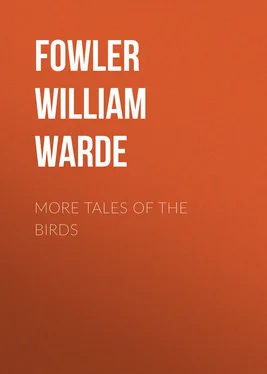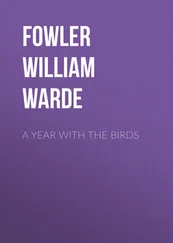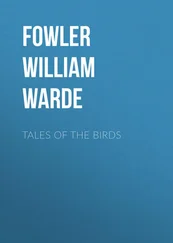William Fowler - More Tales of the Birds
Здесь есть возможность читать онлайн «William Fowler - More Tales of the Birds» — ознакомительный отрывок электронной книги совершенно бесплатно, а после прочтения отрывка купить полную версию. В некоторых случаях можно слушать аудио, скачать через торрент в формате fb2 и присутствует краткое содержание. Жанр: foreign_antique, foreign_prose, на английском языке. Описание произведения, (предисловие) а так же отзывы посетителей доступны на портале библиотеки ЛибКат.
- Название:More Tales of the Birds
- Автор:
- Жанр:
- Год:неизвестен
- ISBN:нет данных
- Рейтинг книги:3 / 5. Голосов: 1
-
Избранное:Добавить в избранное
- Отзывы:
-
Ваша оценка:
- 60
- 1
- 2
- 3
- 4
- 5
More Tales of the Birds: краткое содержание, описание и аннотация
Предлагаем к чтению аннотацию, описание, краткое содержание или предисловие (зависит от того, что написал сам автор книги «More Tales of the Birds»). Если вы не нашли необходимую информацию о книге — напишите в комментариях, мы постараемся отыскать её.
More Tales of the Birds — читать онлайн ознакомительный отрывок
Ниже представлен текст книги, разбитый по страницам. Система сохранения места последней прочитанной страницы, позволяет с удобством читать онлайн бесплатно книгу «More Tales of the Birds», без необходимости каждый раз заново искать на чём Вы остановились. Поставьте закладку, и сможете в любой момент перейти на страницу, на которой закончили чтение.
Интервал:
Закладка:
W. Warde Fowler
More Tales of the Birds
THE LARK’S NEST
It was close upon Midsummer Day, but it was not midsummer weather. A mist rose from moist fields, and hung over the whole countryside as if it were November; the June of 1815 was wet and chill, as June so often is. And as the mist hung over the land, so a certain sense of doubt and anxiety hung over the hearts of man and beast and bird. War was in the air as well as mist; and everything wanted warmth and peace to help it to carry out its appointed work; to cheer it with a feeling of the fragrance of life.
The moisture and the chilliness did not prevent the Skylark from taking a flight now and then into the air, and singing to his wife as she sat on the nest below; indeed, he rose sometimes so high that she could hardly hear his voice, and then the anxious feeling got the better of her. When he came down she would tell him of it, and remind him how dear to her that music was. “Come with me this once,” he said at last in reply. “Come, and leave the eggs for a little while. Above the mist the sun is shining, and the real world is up there to-day. You can dry yourself up there in the warmth, and you can fancy how bad it is for all the creatures that have no wings to fly with. And there are such numbers of them about to-day – such long lines of men and horses! Come and feel the sun and see the sights.”
He rose again into the air and began to sing; and she, getting wearily off the nest, followed him upwards. They passed through the mist and out into the glorious sunshine; and as they hung on the air with fluttering wings and tails bent downwards, singing and still gently rising, the sun at last conquered the fog to the right of them, and they saw the great high road covered with a long column of horsemen, whose arms and trappings flashed with the sudden light. They were moving southward at a trot as quick as cavalry can keep up when riding in a body together; and behind them at a short interval came cannon and waggons rumbling slowly along, the drivers’ whips cracking constantly as if there were great need of hurry. Then came a column of infantry marching at a quickstep without music, all intent on business, none falling out of the ranks; they wore coats of bright scarlet, which set off young and sturdy frames. And then, just as an officer, with dripping plume and cloak hanging loosely about him, turned his horse into the wet fields and galloped heavily past the infantry in the road, the mist closed over them again, and the Larks could see nothing more.
But along the line of the road, to north as well as south, they could hear the rumbling of wheels and the heavy tramp of men marching, deadened as all these sounds were by the mud of the road and by the dense air. Nay, far away to the southward there were other sounds in the air – sounds deep and strange, as if a storm were beginning there.
“But there is no storm about,” said the Skylark’s wife; “I should have felt it long ago. What is it, dear? what can it be? Something is wrong; and I feel as if trouble were coming, with all these creatures about. Look there!” she said, as they descended again to the ground at a little distance, as usual, from the nest; “look there, and tell me if something is not going to happen!”
A little way off, dimly looming through the mist, was a large cart or waggon moving slowly along a field-track. Leading the horses was the farmer, and sitting in the cart was the farmer’s wife, trouble written in her face; on her lap was a tiny child, another sat on the edge of the cart, and a third was astride on one of the big horses, holding on by his huge collar, and digging his young heels into the brawny shoulders below him. All of these the Skylarks knew well; they came from the farm down in the hollow, and they must be leaving their old home, for there was crockery, and a big clock, and a picture or two, and other household goods, all packed in roughly and hurriedly, as if the family had been suddenly turned out into the world. The farmer looked over his shoulder and said a cheering word to his wife, and the Skylark did the same by his.
“Don’t get frightened,” he said, “or you won’t be able to sit close. And sitting close is the whole secret, dear, the whole secret of nesting. I’m sorry I took you up there, but I meant well. Promise me to sit close; if any creature comes along, don’t you stir – it is the whole secret. They won’t find you on the eggs, if you only sit close; and think how hard it is to get back again without being seen when once you’re off the nest! There’s nothing to alarm you in what we saw. See, here we are at the nest, and how far it is from the big road, and how snugly hidden! Promise me, then, to sit close, and in a day or two we shall begin to hatch.”
She promised, and nestled once more on the eggs. It was true, as he had said, that the nest was some way from the road; it was in fact about halfway between two high roads, which separated as they emerged from a great forest to the northwards, and then ran at a wide angle down a gentle slope of corn-land and meadow. In the hollow near to the western road lay the farmhouse, whose owners had been seen departing by the Skylarks, standing in a little enclosure of yard and orchard; near the other road, but higher up the slope, was another homestead. On the edge of the slope, connecting the two main roads, ran a little cart-track, seldom used; just such a deeply-rutted track as you may see on the slope of a south-country down, cutting rather deeply into the ground in some places, so that a man walking up to it along the grass slope might take an easy jump from the edge into the ruts, and need a vigorous step or two to mount on the other side. Just under this edge of the grass-field, and close to the track, the Larks had placed their nest; for the grass of the field, cropped close by sheep, offered them little cover; and they did not mind the cart or waggon that once in two or three days rolled lazily by their home, driven by a drowsy countryman in a short blue frock.
Next day the weather was worse, though the fog had cleared away; and in the afternoon it began to rain. Long before sunset the Larks began to hear once more the rumbling of waggons and the trampling of horses; they seemed to be all coming back again, for the noise grew louder and louder. Each time the cock bird returned from a flight, or brought food to his wife, he looked, in spite of himself, a little graver. But she sat close, only starting once or twice from the nest when the distant crack of a gun was heard.
“Sit close, sit close,” said her consort, “and remember that the way to get shot is to leave the nest. We are perfectly safe here, and I will be hiding in the bank at hand, if any danger should threaten.”
As he spoke, men passed along the track; then more, and others on the grass on each side of it. Then that dread rumbling grew nearer, and a medley of sounds, the cracking of whips, the clanging of metal, the hoarse voices of tired men, began to grow around them on every side. Once or twice, as it began to grow dusk, men tried to kindle a fire in the drizzle, and by the fitful light groups of men could be seen, standing, crouching, eating, each with his musket in his hand, as if he might have to use it at any moment. Officers walked quickly round giving directions, and now and then half-a-dozen horsemen, one on a bay horse always a little in advance, might be seen moving about and surveying the scene. Then more men passed by, and ever more, along the slope; more horses, guns, and waggons moved along the track. A deep slow murmur seemed to rise in the air, half stifled by the pouring rain, and broken now and then by some loud oath near at hand, as a stalwart soldier slipped and fell on the soppy ground. Then, as lights began to flash out on the opposite rise to the southward, a noise of satisfaction seemed to run along the ground – not a cheer, nor yet a laugh, but something inarticulate that did duty for both with wet and weary men. In time all became quiet, but for the occasional voice of a sentinel; and now and then a cloaked form would rise from the ground and try to make a smouldering fire burn up.
Читать дальшеИнтервал:
Закладка:
Похожие книги на «More Tales of the Birds»
Представляем Вашему вниманию похожие книги на «More Tales of the Birds» списком для выбора. Мы отобрали схожую по названию и смыслу литературу в надежде предоставить читателям больше вариантов отыскать новые, интересные, ещё непрочитанные произведения.
Обсуждение, отзывы о книге «More Tales of the Birds» и просто собственные мнения читателей. Оставьте ваши комментарии, напишите, что Вы думаете о произведении, его смысле или главных героях. Укажите что конкретно понравилось, а что нет, и почему Вы так считаете.












